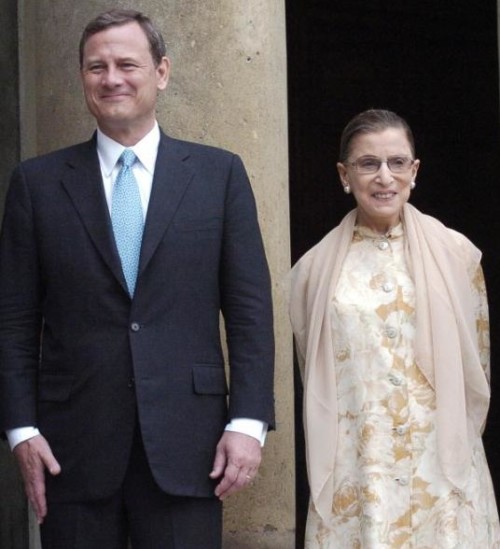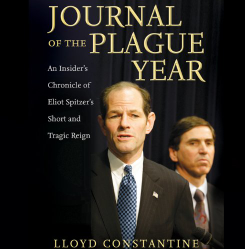Perhaps more. Justice Ginsburg’s sainthood and health issues are old and well known. With John Roberts, canonization began in 2012, when against his own convictions and view of the law he saved ObamaCare from the right wing horde. (Roberts Seizes The Moment, Albany Times Union 7/7/2012). And from that “moment” until last Thursday Roberts has continued to earn, deserve and skillfully exercise the awesome powers of Chief Justice. Roberts’ fragile health only became generally known and of concern two days before the close of the October 2019 Term and announcement of two momentous majority opinions – Trump v. Vance and Trump v. Mazars (and Deutsche Bank) both authored by Roberts.

Chief Justice John Marshall
First, let’s give Justice Ginsburg some of what she is due. Each night since the 2016 election HL and many others especially on the left have prayed for her. But her strength is such that she may grace the high court’s bench for several more years, regardless of who wins this November.
Neither Ginsburg nor any of her colleagues on the left nor Roberts’ conservative brothers have nor can attain the power the Chief has. Nor, obviously, wield it as wisely as Roberts has. Indeed, he exercises far more power than his most recent predecessors, Chief Justices Rehnquist, Burger and Warren. Certainly more than any chief since Charles Evans Hughes and William Howard Taft. Given health and time he someday may even deserve comparison with John Marshall (who served as Chief for 34 years) a jurist Roberts often quotes – as he did liberally in the two Trump opinions.
On the way to those dramatic last two decisions, Roberts dominated the term in a manner and to a degree unrivaled in the 20th and 21st centuries. He used all his tools, including those not widely appreciated. He masterfully used his power to assign the writing of opinions. He strategically blocked review of certain cases. He muscled certain justices (especially Kavanaugh) into doing what he wanted, not what they wanted to do.

Chuck Schumer & Donald Trump
He scolded both the President and the Senate’s Minority Leader Chuck Schumer – actions which SCOTUS – watchers know occur as frequently as the perihelion of Haley’s Comet. Beyond the tongue-lashing of Trump, for his attack on several federal judges and for labeling them according to the President who appointed them (See HL 62 Wednesday November 21, 2018 Was The Turning Point) Roberts also recently slapped down Trump in a short midnight ruling. Roberts wrote that state-specific Covid-19 restrictions were a “dynamic and fact intensive matter” that the “Constitution principally entrusts to the politically accountable officials of the states ‘to guard and protect’” The ruling decisively rejected Trump’s attempt to countermand governors’ orders and to pander to religious groups that claimed to be exempt from Covid-19 restrictions applicable to other organizations (See HL 106).

Justice Anthony Kennedy
Before agreeing to hear June Medical, the Louisiana abortion restriction case that was decided on June 29, Roberts convinced Justice Kavanaugh to vote with him and block review of several other abortion restriction cases involving Planned Parenthood. Roberts clearly wanted to diminish and detoxify the atmosphere after the Kennedy resignation and Kavanaugh confirmation fiasco that focused attention on abortion almost to the exclusion of everything else. Roberts clearly leaned on Kavanaugh to vote against taking these cases. Moreover, Roberts wanted the Courts’ next abortion case to be one where he could make a point about the Courts’ respect for and deference to prior decisions that even he disagreed with and had dissented from. This bodes well for the survival of the core ruling in Roe v. Wade.
And in another case where Roberts blocked review, Cooper v. Harris, he functionally, if not explicitly, admitted his error in a previous decision, the 2013 ruling in Shelby County Alabama v. Holder. That calamitous ruling nullified the pre-registration provisions of the 1965 Voting Rights Act. Roberts’ reasoning in Holder was that minority voter suppression, principally in the South, had been remediated to a degree that federal pre-screening of state procedures was no longer constitutional. Right after that decision North Carolina passed a voting law that the lower court said “targeted African-Americans with almost surgical precision” by eliminating same day registration, pre-registration of teenagers and tabulation of votes cast in the wrong district, while rejecting forms of photo-ID favored by black voters and retaining those favored by white voters. Blocking review of the Circuit Court’s nullification of the North Carolina law and enlisting Kavanaugh in that effort was another demonstration of Roberts behind the scenes power – including unfortunately his power to diminish scrutiny of a very bad opinion he had authored.

Justices Clarence Thomas & Samuel Alito
The Chiefs’ actions in that case, North Carolina v. North Carolina NAACP frames and highlights reasons why many on the left, and notably the editorial board of the New York Times, won’t be praying for Roberts long service on the Court. For them it’s all a numbers game, or what the late Justice Antonin Scalia referred to as “my tennis scoring – 5-4, I win.” For HL that is important but much more is at stake. A full and close reading of Roberts’ two Trump decisions reveal those bigger issues. Sure, we too would like to know whether Donald deducted his golden shower as a medical expense, but we are far more concerned that the Court reaffirmed and to some extent established a good balance between the competing political branches, Congress and the Executive, and between the interests of dual sovereigns, federal and state. And Roberts got all but the reactionary right of Justices Thomas and Alito to agree about the transcendentally and ubiquitously important issues.
Coverage of Roberts has generally focused on his relatively new role as the Court’s swing vote, following Anthony Kennedy’s retirement in 2017. It is clear that if Chief Justice Roberts represents the ideological center of the Court that median is well right of center. However, it’s not clear that Roberts actually is in the ideological middle, because Gorsuch and Kavanaugh are still figuring out who they want to be. While Roberts most frequently casts the tie-breaking votes in 5 to 4 decisions, those votes often have less to do with left to right ideology than his regard for the stature and power of the Court and welfare of the nation. Roberts is papal in his long view of how a current ruling relates to what has preceded and will succeed it.
 Exhibit A – Saving ObamaCare, One. Exhibit B – Saving ObamaCare Two. Exhibit C – the recent decision holding Louisiana’s abortion regulation unconstitutional, June Medical. Exhibit D, the decision that spared the DACA program – Dept. of Homeland Security v. Regents of University of California. Exhibit E – the 1964 Civil Rights Act bars gay and transgender discrimination – Bostock v. Georgia. Ah, but you say Exhibit E, Bostock, was not 5-4 but 6-3 and authored by Justice Gorsuch. He authored it because Roberts assigned him the opinion – in part to get his vote and make this momentous ruling not seem sharply divided, and in part to allow Gorsuch an opportunity to restore some of his and the Court’s credibility. Substantial damage was done during Gorsuch’s deceptive and disingenuous performance at his confirmation. (See HL 26 – Demoralized and Disheartened by Gorsuch Deception). The Kavanaugh Fiasco caused many to forget just how bad Gorsuch and his confirmation were. Roberts has not forgotten.
Exhibit A – Saving ObamaCare, One. Exhibit B – Saving ObamaCare Two. Exhibit C – the recent decision holding Louisiana’s abortion regulation unconstitutional, June Medical. Exhibit D, the decision that spared the DACA program – Dept. of Homeland Security v. Regents of University of California. Exhibit E – the 1964 Civil Rights Act bars gay and transgender discrimination – Bostock v. Georgia. Ah, but you say Exhibit E, Bostock, was not 5-4 but 6-3 and authored by Justice Gorsuch. He authored it because Roberts assigned him the opinion – in part to get his vote and make this momentous ruling not seem sharply divided, and in part to allow Gorsuch an opportunity to restore some of his and the Court’s credibility. Substantial damage was done during Gorsuch’s deceptive and disingenuous performance at his confirmation. (See HL 26 – Demoralized and Disheartened by Gorsuch Deception). The Kavanaugh Fiasco caused many to forget just how bad Gorsuch and his confirmation were. Roberts has not forgotten.
And those Roberts’ exemplars reside among a much longer list since 2012, but especially this last term. HL disagrees with John Roberts’ reasoning and bottom line vote in a majority of cases. But in the 50 plus years we’ve studied, practiced and taught the law HL has not seen a jurist who’s better confronted this monumental responsibility with the willingness and skill to shoulder it and turn it over to successors in the best shape possible. At HL we hope and pray that won’t happen anytime soon.



Best article yet!
Clear concise and totally readable.
Approachable for our “learned” non attorney friends.